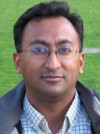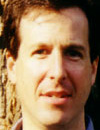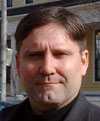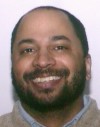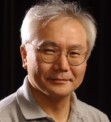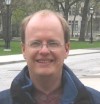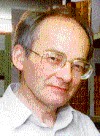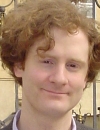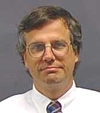D-Lib Magazine
|
G. Sayeed Choudhury
G. Sayeed Choudhury is the Associate Director for Library Digital Programs and Hodson Director of the Digital Knowledge Center at the Sheridan Libraries of Johns Hopkins University. He serves as principal investigator for projects funded through the National Science Foundation, Institute of Museum and Library Services, and the Mellon Foundation. He has oversight for the digital library activities and services provided by the Sheridan Libraries at Johns Hopkins University.
To return to Sayeed Choudhury's article, click (here).
Daniel J. Cohen
Daniel J. Cohen is an Assistant Professor in the Department of History and Art History at George Mason University and the Director of Research Projects at the Center for History and New Media. He is the co-author, with Roy Rosenzweig, of Digital History: A Guide to Gathering, Preserving, and Presenting the Past on the Web (University of Pennsylvania Press, 2005) and author of Equations from God: Pure Mathematics and Victorian Faith (Johns Hopkins University Press, forthcoming). In addition to his research and writing in the history of science and European and American intellectual history, he writes a blog covering the digital humanities. He can be reached via email at <dcohen@gmu.edu>.
To return to Daniel Cohen's article, click (here).
Gregory Crane
Gregory Crane has a long-standing interest in the relationship between the humanities and rapidly developing digital technology. Since 1985 he has been engaged in planning and development of the Perseus Project, which he directs as the Editor-in-Chief. Besides supervising the Perseus Project as a whole, he has been primarily responsible for the development of the morphological analysis system which provides many of the links within the Perseus database. He is currently directing a $2,700,000 grant from the Digital Library Initiative to study general problems of digital libraries in the humanities. Dr. Crane is particularly interested in the extent to which broadcast media such as the World Wide Web not only enhance the work of professional researchers and students in formal degree programs but create new audiences outside academia for cultural materials. His current research focuses on "computational humanities" and how this new field can help to democratize information without compromising intellectual rigor.
To return to Gregory Crane's overview article, click (here).
To return to Gregory Crane's article with Alison Jones, click (here).
Tim DiLauro
Tim DiLauro is the Digital Library Architect in the Library Digital Programs and Digital Knowledge Center of the Sheridan Libraries at Johns Hopkins University. Since 1982, he has worked for JHU in a variety of technology positions. He has been with the Sheridan Libraries since 1990. He has also worked as a consultant for several companies with Internet businesses. Since 1995, his project work has focused on designing systems to improve and simplify user access to information, including the development of access gateways and web proxies. His current work deals with the integration of multiple repositories with multiple services to support digital collections, learning, publishing, and preservation.
To return to Tim DiLauro's article, click (here).
Michael Droettboom
Michael Droettboom has a Master's Degree in Computer Music Research from The Johns Hopkins University, where he studied with Ichiro Fujinaga. From 2000-2005, he worked as a researcher at the Digital Knowledge Center, a research and development arm of the JHU library system, where he developed software for document image analysis. He now works as a software developer at Hillcrest Labs.
To return to Michael Droettboom's article, click (here).
Robert Ferguson
Robert Ferguson is a Software Developer/Programmer for the Digital Knowledge Center at Johns Hopkins University as part of the Gamera and Digital Audio Archives Projects. His research interests include automatic pattern detection in audio signals and images. Ferguson obtained a MA from McGill University in Music Technology in 2004.
To return to Robert Ferguson's article, click (here).
Ichiro Fujinaga
Ichiro Fujinaga is an Assistant Professor in Music Technology Area at the Schulich School of Music at McGill University. He has Bachelor's degrees in Music/Percussion and Mathematics from University of Alberta, and a Master's degree in Music Theory and a Ph.D. in Music Technology from McGill University. In 2003-4, he was the Acting Director of the Center for Interdisciplinary Research in Music Media and Technology (CIRMMT) at McGill. In 2002-3, he was the Chair of the Music Technology Area at the School of Music. Before that he was a faculty member of the Computer Music Department at the Peabody Conservatory of Music of the Johns Hopkins University.
To return to Ichiro Fujinaga's article, click (here).
Alison Jones
Alison Jones works as a researcher at the Perseus Digital Library. She has a BA in History from Mount Holyoke College and an MLS from Simmons College. Her current research interests include digital library interfaces and the digitization of historical collections.
To return to Alison Jones' article, click (here).
Jeffrey A. Rydberg-Cox
Dr. Jeffrey A. Rydberg-Cox is Chair of the Department of English, Director of the Classical Studies Program and an Associate Professor in the Department of English, the Classical Studies Program, the Religious Studies program, and the School of Computing and Engineering at the University of Missouri Kansas City. His work on computational tools to facilitate the transcription and encoding of Latin incunabula is currently supported by a grant from the National Endowment for the Humanities Division of Preservation and Access. After completing his Ph.D. from the Committee on the Ancient Mediterranean World at the University of Chicago in 1998, he worked for two years as a programmer and computational lexicographer with the Perseus Digital Library at Tufts University before taking up his current position in 2000.
To return to Jeffrey Rydberg-Cox's article, click (here).
Wolfgang Schibel
Wolfgang Schibel is currently responsible for the project 'TERMINI - Structured Vocabulary of Early Modern Knowledge' at the University of Mannheim, Germany. He has been involved in the digitization projects MATEO and CAMENA (Mannheim and Heidelberg) since 1996. Trained in Classics (Ph.D. Heidelberg, 1969), he was rare book librarian of the University of Mannheim from 1974 to 2004. Active in Neo-Latin studies since 1986, he has collaborated in several commented editions (e.g. 'Humanistische Lyrik des 16. Jahrhunderts', Deutscher Klassiker Verlag, 1997; Jacob Balde: Urania victrix, l. I & II. Niemeyer Verlag, 2003). His work in digitization focuses on selection of content, subject retrieval and additional information for users.
To return to Wolfgang Schibel's article, click (here).
David A. Smith
After an undergraduate degree in classics, David Smith worked as a programmer for the Perseus Digital Library Project at Tufts University. As Perseus grew from a digital library of the ancient Greek world to a humanities digital library research group, David was gradually corrupted into a computer scientist. Now a computer science Ph.D. candidate at Johns Hopkins University, he works on machine translation, statistical parsing, and optimization. He has participated in developing the Dyna language and the Google Translations system.
To return to David Smith's article, click (here).
Stuart L. Weibel
Stuart Weibel has worked in the Office of Research at OCLC since 1985. During this time he has managed projects in the areas of automated cataloging, document capture and structure analysis, and electronic publishing. He has been active in Internet standards work for fifteen years and for ten years played a leadership role in the Dublin Core Metadata Initiative.
To return to Stuart Weibel's report on WebWise 2006, click (here).
Copyright © 2006 Corporation for National Research Initiatives
Top | Contents
Search | Author Index | Title Index | Back Issues
E-mail the Editor
doi:10.1045/march2006-authors
